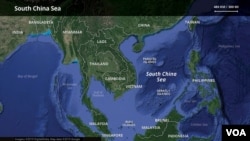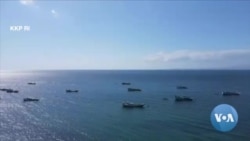Cambodia has thrown a diplomatic wrench in ASEAN plans for joint military drills in the contested South China Sea, in the latest test of Prime Minister Hun Sen's balancing act between the regional bloc and Beijing.
Indonesia's military commander, Admiral Yudo Margono, announced on Thursday that his regional counterparts had agreed on first-ever joint military drills in September.
Margono said the drills would focus on strengthening "ASEAN centrality," while an Indonesian military spokesman cited the "high risk of disaster in Asia, especially Southeast Asia," according to Reuters.
The proposed military exercises would not include combat operations, according to Indonesia.
But General Vong Pisen, commander-in-chief of the Royal Cambodian Armed Forces, released a statement soon after saying that Cambodia had yet to agree to the drills.
Vong Pisen said Indonesia's military chief had raised the idea as the rotating chair of the bloc, but Cambodia and "several other countries" — which were not named — did not respond. He added that a joint statement from the 20th ASEAN Commander-in-Chief Meeting, held in Bali last week, "did not mention ASEAN joint military exercises in the South China Sea."
He said Cambodia's military had now formed a working group to study the proposal and would ultimately request a decision from the Ministry of Defense.
Cambodia's Defense Ministry Spokesperson General Chhum Socheat told VOA Khmer on Friday that the military has not yet confirmed its position on what he called Indonesia's "request." He also claimed that all nine ASEAN members, apart from Indonesia, had yet to respond.
VOA Khmer reached out to the embassies of Indonesia, Thailand and Vietnam in Phnom Penh for comment but did not receive any responses as of Monday morning.
Experts told VOA Khmer the exercises are likely to upset Beijing, which has aggressively staked its claims in the South China Sea.
The spokesperson for the Chinese Embassy in Washington, Liu Pengyu, told VOA on Monday evening that while he wasn't aware of the specifics of the ASEAN exercises, "China believes that defense and security cooperation between countries needs to be conductive to regional peace and stability. They should not escalate tensions or undermine trust between countries, still less target any third party."
On May 27, Beijing announced plans for joint military exercises with Cambodia, Laos, Malaysia, Thailand and Vietnam, but left details unspecified. The exercise "will serve as a stabilizer for regional security," Zhuo Hua, an international affairs expert at the School of International Relations and Diplomacy of Beijing Foreign Studies University, told the Global Times.
Area of rising tension
The South China Sea, rich in natural resources including gas and oil, is a flashpoint of rising tensions between China and the United States. China's claims are contested by Brunei, Indonesia, Malaysia, the Philippines, Vietnam and Taiwan, a self-governing island China claims as its own territory. All but Taiwan are members of ASEAN, and each has its own claims to islands and reefs in the South China Sea.
The apparent dispute — or at least miscommunication — over the joint drills would not be Cambodia's first time breaking from the ASEAN majority on issues related to the South China Sea.
ASEAN failed to reach a consensus on maritime disputes in the sea in 2016 after Cambodia blocked mention of a ruling by an international court in The Hague against Beijing.
That move and others have fueled the perception that Phnom Penh is representing the interests of Beijing in regional matters, as ties between the governments have grown increasingly cozy over the past decade, and Cambodia has increasingly leaned on China for economic support.
Vann Bunna, a researcher at the Cambodian Institute for Cooperation and Peace, told VOA Khmer that the stakes of its pending decision were clear. The military exercises could damage China-ASEAN relations and increase tension in the South China Sea, he said.
"But if we look in the interests of ASEAN, we see that if the military drills were held by ASEAN, it would strengthen the military cooperation between the 10 countries in response to any issue," Vann Bunna said.
Additionally, the joint activities would signal that ASEAN is its own force in the region, separate from either superpower, he added.
Seng Sary, a political analyst and research fellow in social and political sciences at Australia's University of Melbourne, told VOA Khmer on Saturday that Cambodia should carefully consider its options, as its decision would likely be seen as an indicator of its global allegiances.
"Importantly, in the event that Cambodia refuses to participate in military exercises in the ASEAN region, Cambodia itself will put the international community in doubt about Cambodia's bias to China," he said.
"At the same time, Cambodia should consider and examine whether Indonesia, the current chair of ASEAN, will drag Cambodia into the South China Sea dispute between China and Indonesia."









